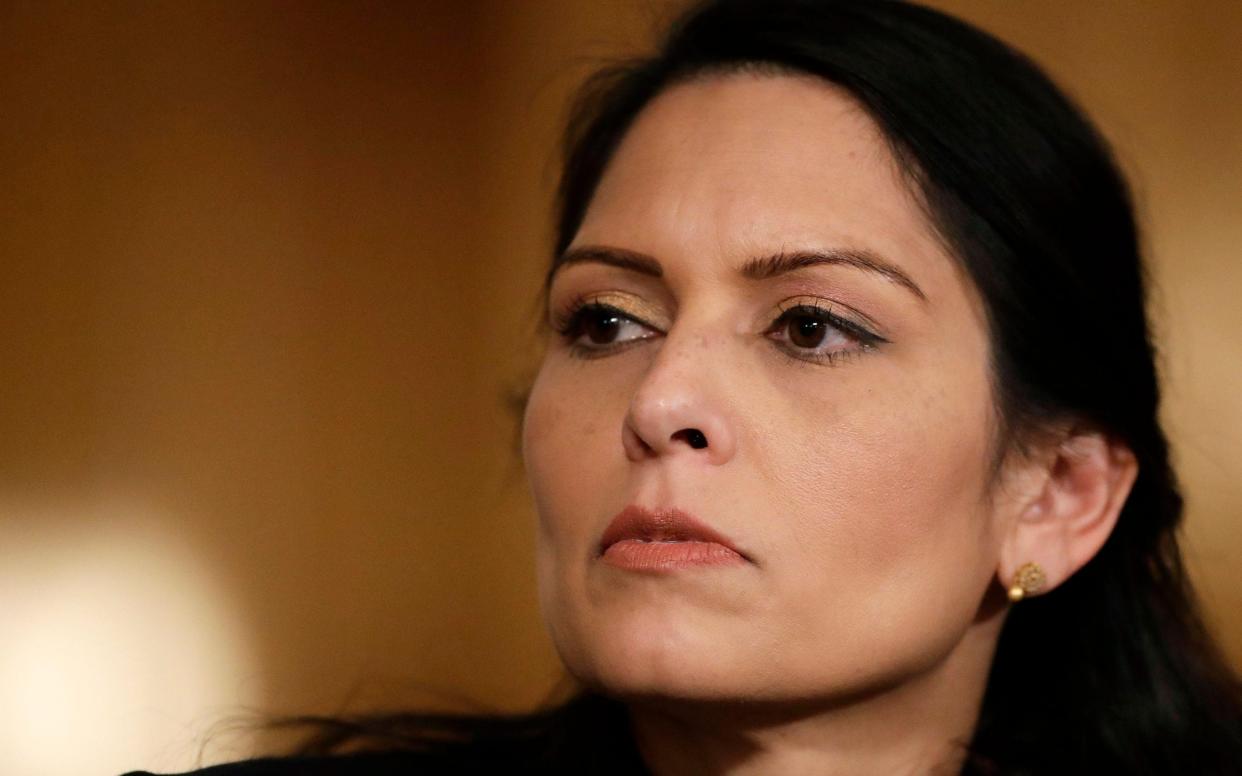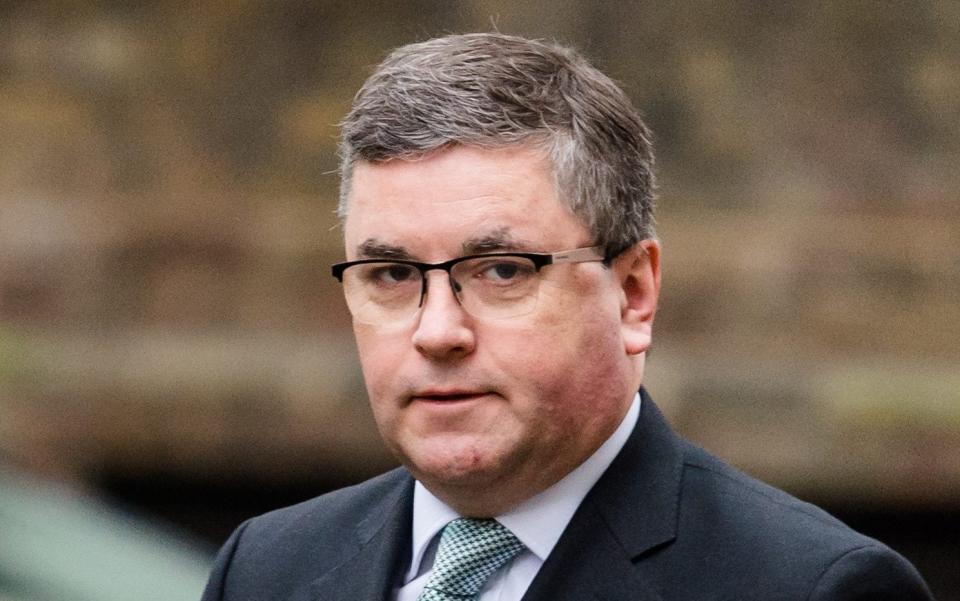Priti Patel ‘deeply ashamed’ so many rape victims have been denied justice

- Oops!Something went wrong.Please try again later.
Priti Patel and Robert Buckland have apologised to rape victims, as they admitted they were “deeply ashamed” that thousands of them have been denied justice.
The Home Secretary, Justice Secretary and Attorney General Michael Ellis said the failings in the criminal justice system were “completely unacceptable,” as they pledged to prosecute more than 1,000 extra rape suspects by the end of the current Parliament.
“We owe this to every victim and are extremely sorry that the system has reached this point,” they said in a 60-page review setting out measures to reverse plummeting rape prosecution rates.
“These are trends of which we are deeply ashamed. Victims of rape are being failed. Thousands of victims have gone without justice. But this isn’t just about numbers – every instance involves a real person who has suffered a truly terrible crime.
“We are not prepared to accept that rape is just ‘too difficult’ a crime to prosecute. We can, and must, do better. At the heart of this review is a system and culture change to ensure that victims feel supported and able to stay engaged with their case.”
Falling prosecution rates
The review revealed more than half (57 per cent) of rape victims withdraw from their cases because they feel disbelieved or judged, fear for their mental health, and cannot face the trauma of a trial.
Of an estimated 128,000 rape victims in the past year, just 1,929 saw their suspected attacker charged, a rate of only 1.5 per cent, down from more than eight per cent on just five years ago.

The review blamed the collapse on intrusive police probes into victims’ digital communications, court and investigative delays, a lack of specialist resources and “inconsistent” support for survivors, including cases where the police inquiries were dropped without any explanation.
The ministers set an ambition of returning the numbers of rape suspects charged back to 2016 levels, the point at which they started to fall, by the end of the current Parliament in 2024. This would mean more than 1,000 more victims should see their perpetrators brought to trial.
They promised to publish regular “score cards” showing how quickly police and prosecutors brought cases to court, assessing the quality of their work and whether victims were satisfied. The first will be published by December.
If prosecutors and police fail to restore charging rates, ministers will consider a new more punitive regime to "hold [them] to account for delivery of operational improvements".
Combatting ‘rape myths’
The Law Commission has also been asked to review if there should be tougher restrictions on courts’ cross-examination of victims’ previous sexual relationships and measures to combat “rape myths” among juries, lawyers and judges.
“Reporting a rape takes a huge amount of bravery, so it is intolerable that the process of seeing a complaint through can be so painful, frustrating, and exhausting,” said the review.
Police will be expected to return mobile phones to victims within 24 hours rather than months – and provide an identical replacement phone if they cannot meet the deadline.
This will require speedier data extraction technology and funding for “cyber vans” that allow devices to be analysed without the need to send them to a laboratory, which can add to delays. It would enable up to 10,000 devices each year to be processed at the earliest stages of an investigation.
End to ‘digital strip searches’
New guidance will require police to request information that is “necessary and proportionate” to their investigation to prevent “digital strip searches”, where victims feel officers have trawled through their lives and relationships on "fishing expeditions".
Police will be expected only to request phones be handed over when there is “a reasonable line of inquiry and not as a matter of course” with victims told of their rights to refuse.
Ms Patel will write to the 43 police forces in England and Wales urging a suspect-focused approach in investigations rather than concentrating on testing the credibility of victims.
It means police will focus more on suspects’ patterns of behaviour before, during and after reported attacks, and any previous sexual offending.
A project trialling the approach, known as Bluestone and led by Avon and Somerset police, will be extended to four more police forces under the sobriquet of Soteria, who was a Greek goddess for safety and salvation. They are the Met, Durham, South Wales and West Midlands police forces.
Victims will also be able to pre-record their evidence, including cross-examination by lawyers, which would then be played during a trial sparing them the trauma of appearing in court. It will be trialled in three more crown courts before plans to extend it nationwide.
Ministers believe the move could increase guilty pleas by accused rapists who often hold out for a trial in the knowledge that their victim may withdraw. By knowing that their victim has already given evidence in front of a judge, ministers believe it would tip more suspects into accepting their guilt.
We're transforming the justice system so more rapists will face the consequences of their actions
The Government has just published a sweeping set of reforms designed to better support victims, writes Solicitor General Lucy Frazer, so that we can increase the number of rape cases reaching court.
As part of our plans we will: improve the quality of investigations and reduce the time taken for victims to be given their phone back during the course of an investigation; improve the culture of joint working between police and prosecutors; and, for the very first time, each part of the criminal justice system will be held to account through performance scorecards.
I am confident that together these measures mean that more victims have their day in court and more rapists are put behind bars.
The Action Plan follows an end-to-end review by the Government into how the criminal justice system handles rape. It comes following falls in the number of police referrals, charges, prosecutions and therefore convictions for rape over the last five years, despite there being little change in the overall prevalence of rape and sexual violence.
Appallingly, one in two victims who report being raped withdraw from the investigation.
Navigating the system
Victims of sex crimes have to navigate a complex criminal justice system and we have a duty to provide them with more support to do this. As part of the Action Plan we are investing £27 million of funding into better supporting victims as they progress their case through the system. This will include recruiting more Independent Sexual Violence Advisers (ISVAs) to ensure that victims have the emotional and practical support that they need, when they need it.
It is no surprise that many victims choose not to continue with an investigation into rape. This process can be stressful and invasive. Victims are often asked to hand over personal and sensitive information and can be left without their mobile phone – their main line of communication and support – for lengthy periods of time.
That is why the Government is investing in new technology to increase police capacity to speed up the return of victims’ devices – our ambition is that no victim will be left without a phone for more than 24 hours.
This work to improve the response to rape is a collaborative effort and I know that all criminal justice agencies are committed to the actions in this review. As one of the ministers who is responsible for the performance of the Crown Prosecution Service (CPS) I have seen first-hand its commitment to driving forward improvements. The Director of Public Prosecutions, Max Hill QC, shares my determination to improve outcomes for victims of rape and other serious sex crimes.
Joined-up approach
The Police and CPS are already working together to improve co-operation and communication between the police and prosecutors, creating a more joined-up approach which addresses what were sometimes strained relationships. Better cooperation between all parts of the justice system is key to driving up performance.
The CPS has also updated its rape legal guidance to include more content on rape myths and stereotypes and specialist prosecutors are being trained on this updated guidance to make absolutely clear that myths and stereotypes should not influence decision making.
The Government has already invested an extra £85 million in the CPS which has allowed specialist rape prosecutors to dedicate more time to each case and improve communication with victims.
But this is public money, and it is only right that the Government and criminal justice agencies are accountable, so that we can see tangible outcomes for this spending. That is why regular scorecards are being introduced. These will show the system’s performance on a host of measures ranging from the length of time taken to progress cases to levels of victim engagement.
This will ensure that we are able to track the impact of our actions on performance in the criminal justice system, as well as progress of criminal justice agencies against our ambition to return levels of cases being referred by the police, charged by the CPS, and going to court to pre-2016 levels before declines began.
And if we don’t see results from these reforms? Well, we will look further into more fundamental changes to the criminal justice system. Rest assured the Government is committed to increasing the appallingly low number of rape victims who have their day in court and see justice done.
Our actions must ensure that we never slip backwards again.
Lucy Frazer is the Solicitor General

